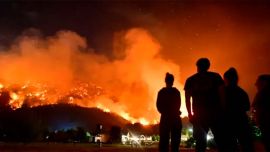In Argentina's famed wine-producing province of Mendoza, protests have erupted over the alteration of a law that protected water systems and blocked mining projects in the region.
In recent days thousands of protestors gathered outside of the Provincial Legislature to reject Friday's passage of modifications to Law 7722, which paves the way for 19 proposed mining ventures in the province. On Monday, those demonstrations turned violent, as a handful of protesters hurled rocks at police officers. The security forces responded with tear and rubber bullets, in worrying scenes captured on camera. Lawmakers and union leaders have since denounced the "brutal repression" of protesters and demanded those arrested by released.
The controversial modifications that have angered local residents were presented by Governor Rodolfo Suárez (Unión Cívica Radical, UCR) – who in recent days has received death threats – and were passed thanks to an alliance between lawmakers from both Peronist and Radical parties.
Provincial lawmaker Jorge Difonso (Cambia Mendoza), a lawyer by trade, was one of the original authors of Law 7722 – first passed in 2007, under then-governor Julio Cobos – which had previously restricted the use of dangerous chemicals in mining operations and blocked water-intensive projects in the region amid concerns over their environmental impact.
On Tuesday, Difonso said he would present a claim before the Supreme Court asking that the new law be declared unconstitutional. A few hours earlier, he spoke to the Times about the dangers mining poses for Mendoza and both the immediate and projected impact of last Friday’s vote.
Can you provide some background on the law? What were your intentions while drafting it and what is it intended to protect?
We became aware, at the beginning of the year 2000, of different mining ventures in other parts of the world that had caused some environmental problems for their neighbouring communities and, given that in the Uco Valley they began to ask for prospecting rights, we thought we would study the issue. And we came to the conclusion that the use of cyanide, sulphuric acid and other substances in the mining industry would be problematic in terms of water protection, which for this area is very important both for human consumption and agricultural irrigation.
So in 2007, I proposed a law – that eventually was passed – prohibiting the use of cyanide, sulphuric acid, and mercury in metalliferous mining, as well as other regulations for those kinds of practices. This law was in force for 12 years and was subject to more than 10 claims of unconstitutionality in The Supreme Court from different mining companies.
The court ruled in favour, in plenary and a unanimous manner, of the validity and constitutionality of the law.
Why is this law so important for Mendoza and, in general, for Argentina?
The mega-mining model is a real threat to of Mendoza's water supply. Mendoza has been in a water crisis for 10 years. Our rivers and streams have 50 percent of their historical volume and mega-mining requires millions of litres of water, and introduces the risk of eventual contamination that can be caused by the use of certain chemicals. We understand clearly that the use of cyanide and sulphuric acid jeopardises water quality.
One must take into account the historical production of Mendoza, which in addition to being the foremost producer of wine and grapes, is home to a number of other agricultural enterprises involving crops like garlic, oregano, olives as well as livestock. The tourism industry is important – both gastronomic tourism and mountain tourism – [and] all are essential for sustainable economic development. For these industries we need soil and water [to be] in [a] good condition.
Why was the passage of the modification unique, politically speaking?
Because although this reform continues to be pushed by the governing party, which is the Radical party, it has had support from the Justicialist Party [Partido Justicialista, PJ], which is the main opposition party. But in all the fronts that make up the parliament, they [senators and legislators] have voted across the aisle. They [various parties] have all [suffered] defections on this bill. Even though they have two-thirds of parliament, the official bloc had dissent, as did the PJ, and other minority parties. There was no homogeneity in the parties when it came to voting for ‘Yes’ or ‘No.’
I believe that it has to do basically with the regions where people live and the sense of belonging of the legislators to their districts. In my case, I have been in office for 12 years and I am really committed to my district and also as a co-author of Law 7722 in 2007.
Is there any tension within your own party [Cambia Mendoza] on the issue?
Yes, a very strong tension since on this issue we have been confronted by Governor [Rodolfo] Suárez; He has a very different, a completely opposite opinion. Furthermore, I think that Mendoza, with this reform, is going against global trends, where thousands of scientists are dictating and advising the implementation of measures to mitigate climate change and global warming.
Mendoza, with this decision, has regressed 12 years.
How is the public reacting in Mendoza?
The people are really angry. Angry about what happened. They're very angry about the governor. They have been feeling betrayed and disillusioned. This is what I'm sensing in meetings.
What kind of behaviour have you seen from protestors and was the police's response on Monday as violent as has been claimed?
Yes, unfortunately. Everything culminated in a march that began yesterday in which thousands of Mendocinos participated in, on their way to the City of Mendoza – young people, women, farmers, professors, all kinds of people participated in perfect harmony with the police.
The march made it to the Government House in Mendoza with more than 15,000 people present. The march was peaceful, with a petition [calling on] the governor to veto the reform and at the last minute 10 to 15 people infiltrated [the march] and caused a disturbance with the police and now the police are repressing everyone-- many people who were in the march. They've been using gas and rubber bullets from what I understand.
How are Mendocinos and lawmakers alike seeking to move forward in the wake of this ruling?
The truth is that after what happened today, with this incident and how this march ended – this march that was perfect and non-violent [before] – I don't know a way forward."
From our end we [the lawmakers in support of the original version of Law 7722] are going to raise a judicial appeal of unconstitutionality against the reform to Law 7722 because we believe it goes against the Argentine Constitution and the General Environmental Law, especially the clause regarding progressiveness and non-regression, seeing as how Friday’s ruling allowed the use of polluting chemicals that were previously prohibited.
What can we expect for Mendoza in the years to come?
Here we fear that we will have the same problems we see happening elsewhere, like San Juan [Province]. Recently, a well-known episode took place there, in the district of Jáchal – there was a cyanide spill into the River Jáchal.




















Comments